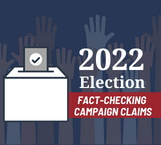Quick Take
A ballot question in Connecticut asks voters if they want to enact early voting. But a social media post falsely claims the proposal would also “remove the requirement of a certified seal from certain ballots.” The measure refers to removing a seal on a list of election results and has nothing to do with ballots.
Full Story
Voters in Connecticut will have the option to establish early voting in the state by answering “yes” to a ballot question in this November’s election.
Currently, Connecticut is one of four states that doesn’t offer early in-person voting, according to the National Conference of State Legislatures. The other three are Alabama, Mississippi and New Hampshire.
 The proposed constitutional amendment to establish early voting received support from more than 30 civic and political organizations in Connecticut — including the AARP, the American Civil Liberties Union, and the Connecticut Town Clerks Association. It passed with bipartisan support in both the state House and Senate.
The proposed constitutional amendment to establish early voting received support from more than 30 civic and political organizations in Connecticut — including the AARP, the American Civil Liberties Union, and the Connecticut Town Clerks Association. It passed with bipartisan support in both the state House and Senate.
Now it’s being put to voters, who will be presented with a ballot question that asks: “Shall the Constitution of the State be amended to permit the General Assembly to provide for early voting?”
But a post on social media makes the false claim that answering “yes” to the question would also “remove the requirement of a certified seal from certain ballots when submitted to the Secretary of the State (meaning that certain ballots don’t have to have security seals to be processed because we can trust them @ @ wink-wink-nudge-nudge saynomore).”
That’s not true.
The proposed amendment would — in addition to establishing early voting — amend the state’s constitution to remove a requirement that some copies of election results that are sent to the secretary of state be under seal.
The state constitution currently says (emphasis ours): “At all elections for members of the general assembly the presiding officers in the several towns shall receive the votes of the electors, and count and declare them in open meeting. The presiding officers shall make and certify duplicate lists of the persons voted for, and of the number of votes for each. One list shall be delivered within three days to the town clerk, and within ten days after such meeting, the other shall be delivered under seal to the secretary of the state.”
The proposed measure would remove the words “under seal” from the sentence in bold.
Desmond Conner, spokesman for Connecticut’s Office of the Secretary of the State, explained in an email to FactCheck.org that the elimination of the seal requirement is meant to update archaic language and would have no impact on ballot security.
“In the late 1700s and early 1800s the town clerks delivered the election *results* [not ballots] … to the Secretary of the State after sealing them with hot wax,” he said. “That requirement is still in the constitution, and the amendment, in addition to allowing for early voting, would remove the hot wax seal requirement.”
He also emphasized that “this has nothing to do with ballots, ballots are never and have never been done with a wax seal.”
State law setting out requirements for how municipalities transmit election results to the secretary of state has changed over the years. In 1995, for example, it changed to allow transmission by fax and in 2003 it allowed transmission by “other electronic means,” according to the legislative history of Connecticut’s election law.
Under the current system, Conner said, “town clerks mail the results to us after entering it into the election night reporting system.”
Referring to the proposed amendment, Conner said, “this change in the constitution would remove the constitutional requirement that the results are given under seal (with a wax and seal), but as a practical matter nothing will change, they will still enter the results into the system and mail us a copy.”
“To be clear,” he said, “ballots aren’t affected at all here; this has nothing to do with the ballots. Ballots are still returned by voters sealed twice – an inner envelope and an outer envelope.”
So, the social media post misrepresents what the ballot measure would do. It would have no effect on ballot security.
Editor’s note: FactCheck.org is one of several organizations working with Facebook to debunk misinformation shared on social media. Our previous stories can be found here. Facebook has no control over our editorial content.
Sources
National Conference of State Legislatures. Early in-person voting. 30 Aug 2022.
Connecticut House. House Joint Resolution No. 59, RESOLUTION APPROVING AN AMENDMENT TO THE STATE CONSTITUTION TO ALLOW FOR EARLY VOTING. Accessed 27 Oct 2022.
Connecticut Office of Legislative Research. Ballot Question and Explanatory Text for 2022 Proposed Constitutional Amendment on Early Voting. 14 Sep 2022.
Constitution of the State of Connecticut. Cga.ct.gov. Accessed 27 Oct 2022.
Conner, Desmond. Spokesman, Connecticut Office of the Secretary of the State. Email to FactCheck.org. 28 Oct 2022.
Connecticut General Assembly, Government Administration and Elections Committee. Joint favorable report HJ-59. 5 Mar 2021.
General Statutes of Connecticut. Chapter 148 Election Canvass and Returns. Sec. 9-314. Accessed 28 Oct 2022.